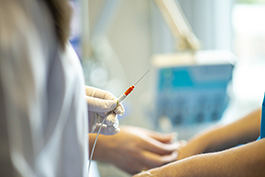Religious Exemptions for COVID Vaccines: What Catholics Should Know
- BISHOP THOMAS J. PAPROCKI
Bishop Paprocki of Springfield, Ill. offers guidance to Catholics concerned about the COVID vaccine.
 Editor's Note: This column by Bishop Thomas Paprocki of Springfield, Ill. originally ran in the Catholic Times. It is reprinted here with permission. Bishop Paprocki also notes that Catholics in other states still need to check on their specific rules for vaccine exemptions.
Editor's Note: This column by Bishop Thomas Paprocki of Springfield, Ill. originally ran in the Catholic Times. It is reprinted here with permission. Bishop Paprocki also notes that Catholics in other states still need to check on their specific rules for vaccine exemptions.
My dear brothers and sisters in Christ:
Debates about mask mandates and required vaccinations are much in the news in light of Governor Pritzker’s Executive Order seeking to slow the spread of COVID. In the Diocese of Springfield in Illinois, our schools are already complying with the Governor’s prior Executive Order regarding masks, and our parishes are asked to follow the new mask mandate in indoor public places. Our parishes will also continue other safety measures as COVID cases, hospitalization rates, and ICU admissions have risen rapidly in recent weeks.
The Executive Order’s face covering requirement for indoor public places applies to “all individuals in Illinois who are age two or over and able to medically tolerate a face covering (a mask or cloth face covering).” Noting that some people may be excused from wearing a face covering for medical reasons, no one is to be excluded from attending Mass for not wearing a face covering. The obligation to attend Holy Mass on Sundays and Holy Days of Obligation is paramount since eternal life is the most important consideration. As Pope Pius XII said in his November 24, 1957, address to Catholic physicians and anesthesiologists, “Life, health, all temporal activities are in fact subordinated to spiritual ends.”
Also, since the sanctuary of the church is not a public place— in that people are not free to walk through the sanctuary area where the altar, ambo, and tabernacle are located—priests, deacons, and lectors are not expected to wear face coverings while fulfilling their functions at Mass, since this would interfere with their public speaking and the performance of their liturgical roles.
With regard to mandatory vaccination, while the Church promotes vaccination as morally acceptable and urges cooperation with public health authorities in promoting the common good, there are matters of personal health and moral conscience involved in vaccines that must be respected. Therefore, vaccine participation must be voluntary and cannot be forced, as the Congregation for the Doctrine of the Faith, under the authority of Pope Francis, indicated last December. While we encourage vaccination, we cannot and will not force vaccination as a condition of employment or the freedom of the faithful to worship in our parishes.
Further, it is imperative that the faithful who choose not to be vaccinated recognize their moral duty to take other measures to protect others from harm. Whether or not one is concerned about personal risks associated with COVID, each person has a moral duty to act responsibly out of concern for his or her neighbor by diligently following other safety measures.
In this regard, the Executive Order’s vaccination requirements for health care workers, school personnel, higher education personnel, and state-owned or operated facilities provides the following exemption: “Individuals will be exempt from the requirement to be fully vaccinated against COVID-19 if (l) vaccination is medically contraindicated, including any individual who is entitled to an accommodation under the Americans with Disabilities Act or any other law applicable to a disability-related reasonable accommodation, or (2) vaccination would require the individual to violate or forgo a sincerely held religious belief, practice, or observance. Individuals who demonstrate they meet the requirements for an exemption will be subject to additional testing requirements.”
In seeking to demonstrate that they have “a sincerely held religious belief, practice, or observance,” some people have been asking priests to write a letter on their behalf and some employers are requiring such letters from clergy. I would argue that such letters are unnecessary and inappropriate. In an article that I coauthored last April in The Observer with Professor Gerard Bradley, who teaches constitutional law at Notre Dame Law School, we wrote that giving “perspicuous witness to the truth about the horrors of abortion . . . does not depend upon holding the Catholic faith, or adhering to any other religion. It is based upon moral and scientific considerations equally available to all persons. For that reason, there is no non-arbitrary ground to distinguish ‘religious’ from simply ‘moral’ objections to the vaccine.” In that sense, no one should need a letter from a priest, as we also wrote, “A religious, moral or other exemption of conscience should be ascertained not by documents, but by a simple conversation seeking only to establish that the individual has a sincerely held, reasonable belief that they should not receive the vaccine.”
Moral objections of conscience should be respected, but should not require a letter from a priest or other clergyman, since the objection is based on the person’s individual personal conscience, not some specific tenet of the Catholic faith. It is not even apparent what any such letter from a priest could helpfully say, beyond restating what I have here recounted, which is that the Catholic Church teaches that some persons may have conscientious objections to the taking of the COVID vaccines, and that these conscientious convictions ought to be respected. (Note that the National Catholic Bioethics Center has provided a Vaccine Exemption Template Letter for Catholics who themselves seek an exemption from an immunization requirement.)
In the event, however, that an employer requires a letter from the clergy, the essential point for which the attestation of a Catholic priest might be helpful is therefore the primacy of conscience, as Pope St. Paul VI wrote in his 1965 “Declaration on Religious Freedom” (Dignitatis Humanae, no. 13), “The Christian faithful, in common with all other men, possess the civil right not to be hindered in leading their lives in accordance with their consciences.” More recently, Pope Francis has said, “The conscience is the interior place for listening to the truth, to goodness, for listening to God; it is the inner place of my relationship with Him, the One who speaks to my heart and helps me to discern, to understand the way I must take and, once the decision is made, to go forward, to stay faithful.” Thus, while Catholics are not bound to refuse the vaccine as a form of immoral cooperation with abortion, and while there is a prima facie obligation to cooperate with public health authorities in promoting the common good, each Catholic must make his or her own decision, in light of each person’s particular situation and moral responsibilities. The Catholic Church recognizes that some Catholics will be bound in conscience to refuse the vaccine.
May God give us this grace. Amen.
 This is Meaghen Gonzalez, Editor of CERC. I hope you appreciated this piece. We curate these articles especially for believers like you.
This is Meaghen Gonzalez, Editor of CERC. I hope you appreciated this piece. We curate these articles especially for believers like you.
Please show your appreciation by making a $3 donation. CERC is entirely reader supported.

Acknowledgement
 Bishop Thomas John Paprocki. "Religious Exemptions for COVID Vaccines: What Catholics Should Know." National Catholic Register (September 2, 2021).
Bishop Thomas John Paprocki. "Religious Exemptions for COVID Vaccines: What Catholics Should Know." National Catholic Register (September 2, 2021).
© 2021 EWTN News, Inc. Reprinted with permission from the National Catholic Register.
The Author
 The Most Reverend Thomas John Paprocki is bishop of the Diocese of Springfield in Illinois. In his spare time, he runs marathons and plays goalie for his amateur hockey team, which plays in the adult Masters' Hockey League in Chicago. Bishop Paprocki is the author of Holy Goals for Body and Soul: Eight Steps to Connect Sports with God and Faith. Bishop Paprocki's regular column in the Catholic Times diocesan newspaper can be found here.
The Most Reverend Thomas John Paprocki is bishop of the Diocese of Springfield in Illinois. In his spare time, he runs marathons and plays goalie for his amateur hockey team, which plays in the adult Masters' Hockey League in Chicago. Bishop Paprocki is the author of Holy Goals for Body and Soul: Eight Steps to Connect Sports with God and Faith. Bishop Paprocki's regular column in the Catholic Times diocesan newspaper can be found here.




